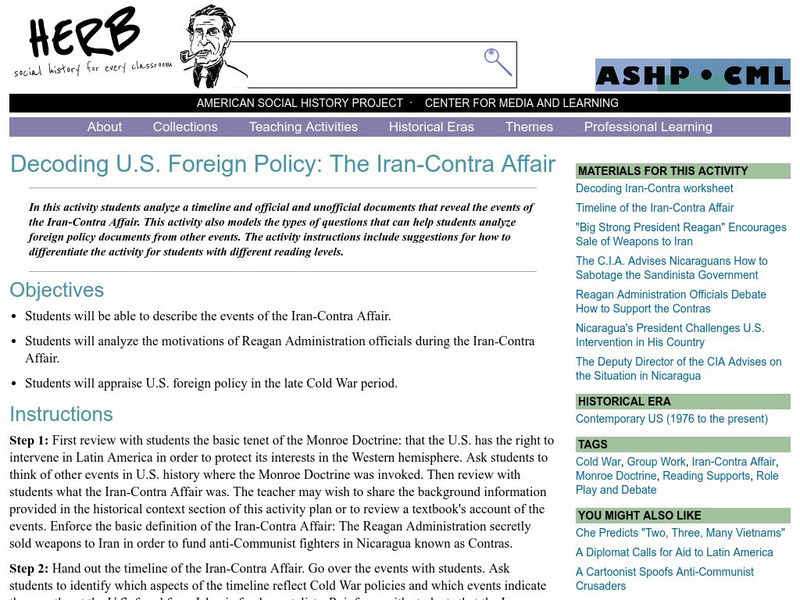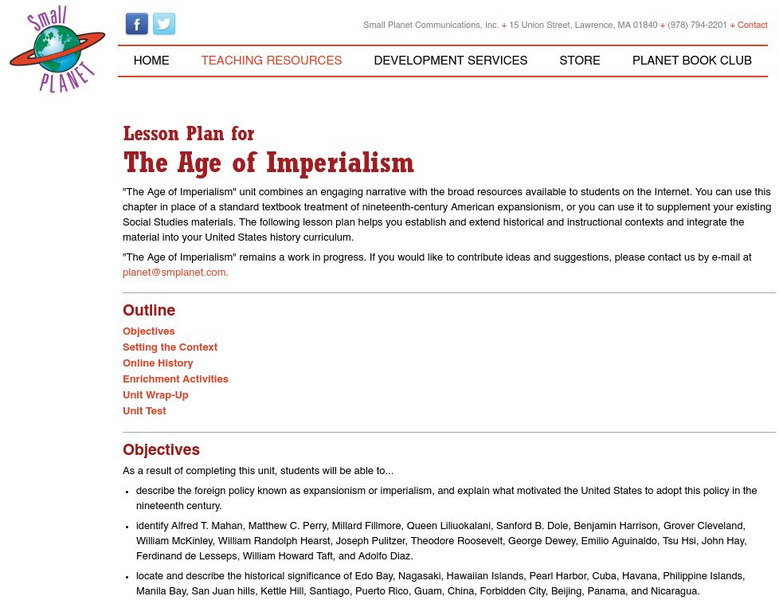Curated OER
The Monroe Doctrine: Whose Doctrine Was It?
Was James Monroe the sole contributor of the Monroe Doctrine? Young scholars study the doctrine and cite evidence to show contributions of John Quincy Adams and Thomas Jefferson in its formulation.
National Endowment for the Humanities
The Monroe Doctrine: A Close Reading
Students identify specific passages in the Monroe Doctrine to events in early U.S. diplomacy.
Curated OER
The Monroe Doctrine: President Monroe and the Independence Movement in South America
Young scholars identify conditions in Europe that relate to the independence movements in South America and list reasons why President Monroe gave for recognizing the independence movement in South America.
Curated OER
The Monroe Doctrine: U.S. Foreign Affairs (circa 1782-1823) and James Monroe
Students read the test of the Monroe Doctrine then list the key points and discuss its central tenets.
Curated OER
"Lista Negra-The Black Lists"
Students review the history and political motivation behind the U.S. adoption of the Monroe Doctrine and how national security measures collide with the issues of due process and human rights during times of war. They learn about how the...
Curated OER
Changing Landscape at the Fort Vancouver Reserve
High schoolers investigate the international background and consequences of The Louisiana Purchase, The War of 1812, and The Monroe Doctrine. The lesson helps to improve critical thinking skills about American History.
Curated OER
Manifest Destiny
Students identify the implications of Manifest Destiny. In this Westward Expansion lesson, students view a PowerPoint presentation on the topic and then respond to questions based on the details of the presentation.
Curated OER
Diplomatic Duties
Tenth graders research and illustrate the diplomatic policies of American presidents, and write letters critiquing the policies of specific presidents. March 17, 2003)
US National Archives
Our Documents: The Monroe Doctrine (1823)
The Monroe Doctrine has been used in the past 180 years to let the United States' stance on European involvement in the Western Hemisphere be known. On this interesting site you can view an interactive copy of the original pages of the...
Independence Hall Association
U.s. History: The Roosevelt Corollary and Latin America
See how the Roosevelt Corollary expanded on the Monroe Doctrine and allowed for intervention in Latin American affairs.
PBS
Pbs: American Experience: Tr: Foreign Affairs
An overview of Theodore Roosevelt's views on foreign policy beginning in his role as Assistant Secretary of the Navy, and continuing throughout his presidency. The article includes his creation of the Roosevelt Corolarry to the Monroe...
University of Virginia
Miller Center at Uva: u.s. Presidents: John Quincy Adams
This site contains a detailed biography of John Quincy Adams. From the right-hand toolbar, select information about his life before and after his presidency, his campaigns and elections, and his domestic and foreign affairs. Also, you...
City University of New York
American Social History Proj.: Decoding u.s. Foreign Policy: Iran Contra Affair
Students explore the Iran-Contra Affair using a timeline and related documents, and practice critical thinking about US foreign policy during the late Cold War years, and about the actions of officials of Ronald Reagan's government. They...
Other
Small Planet Communications: The Age of Imperialism
This website gives detailed information on U.S, imperialism including lesson plans. Presented in outline format.















